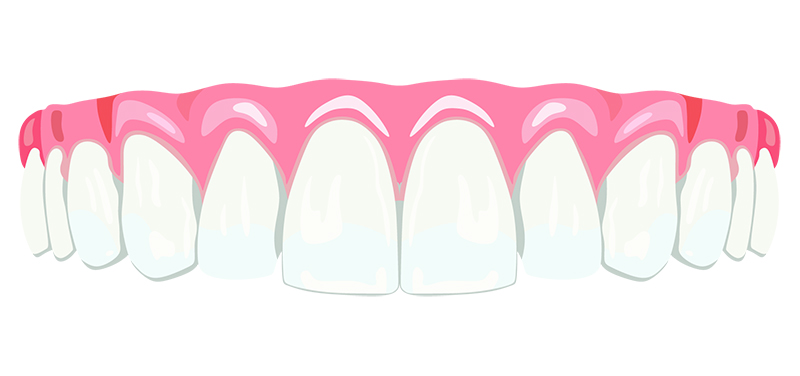Everyone prefers when a trip to the dentist is filled with pleasant news–such as how minimal the plaque and tartar buildup on their teeth is, how the beneficial results of their daily brushing and flossing are quite evident, how they have no issues with decay and so on. Dentists prefer this too, and truly the only reason they will share less than pleasant news is so that any issue that does exist can be resolved as quickly as possible. However, it is understandable that some of the news that your dentist may need to share with you may not be easily grasped. Such is often the case with gum recession; it is not unusual for patients to have no idea what gum recession really is, and why resolving it is essential to their oral health, and yet it is one of the most common dental issues.
Reasons Behind Gum Recession
Gum recession is when the gums around the teeth start to pull down and away from the teeth. This can cause several issues, because the gums actually help to hold teeth firmly in place, so receding gums can lead to loose teeth. Furthermore, receding gums tend to form what are called periodontal pockets, which are essentially gaps that can accumulate harmful oral bacteria and food particles. This can lead to gum disease and serious tooth decay, among other issues.
Most of the individuals who suffer from gum disease don’t realize it, largely because the condition begins without detectable symptoms and progresses very slowly. There are some easily discernible signs of receding gums, such as discolored, unhealthy-looking gums, apparent lengthening of the tooth, cavities at or around the gum line and gum disease, but in many cases the individual’s first clue is when their dentist tells them they have receding gums.
Some of the common causes for receding gums include:
- Gum disease. This is the most common cause for receding gums, and occurs when harmful oral bacteria build up in your mouth. These bacteria produce acids that eat away at the teeth, gums and the bones that hold teeth in place. This creates periodontal pockets where more bacteria can accumulate and the cycle continues to get progressively worse.
- Hormonal imbalances. The changes in hormone levels that occur when boys go through puberty and women go through pregnancy or menopause can result in gum recession.
- Genes. Some individuals inherit genes that make their immune system a little weaker than is normal or desirable, and these individuals tend to be more prone to gum recession and gum diseases as a result.
- Brushing teeth too forcefully. Some individuals erroneously believe that the more forcefully they brush their teeth, the better they can clean them. Actually, forceful tooth brushing is unnecessarily abrasive and can lead to tooth and gum issues, including worn tooth enamel and weakened gums. Brushing gently for longer stretches of time and using a soft-bristled toothbrush is far more effective at helping you to maintain optimal oral hygiene.
- Tobacco use. Any tobacco use, which includes chewing tobacco and smoking tobacco cigarettes, tends to stain the teeth and damage the gums. Weak, damaged gums are less resistant to acid-producing bacteria, so it is not unusual for those who use tobacco to suffer from gum disease and other issues.
- Tooth grinding. Regular tooth grinding puts undue pressure on your teeth and gums, causing movement down at the root of the teeth and creating spaces and gaps around the gum line for bacteria to accumulate. This, in turn, opens the door to gum recession.
- Uneven bite. You use an incredible amount of force when you bite down and chew. When your teeth and bite are properly aligned and healthy they are designed to handle this force well. With crooked teeth and an uneven bite, however, the force of your bite creates gaps in the gum line and pulls the gums away from the teeth.
- Piercings on the lips or tongue. Piercings irritate your gums, making them weak and more likely to pull away from the teeth.
- Improper oral hygiene habits. If you fail to brush your teeth twice a day, floss once a day and visit your dentist every six months for examinations and cleanings, you are not able to keep your teeth, gums and mouth clean and healthy. This results in the buildup of harmful oral bacteria, which contributes to gum recession.
Mild gum recession can usually be handled at the dentist’s office, with very thorough dental cleaning procedures like tooth scaling and root planing. With the elimination of harmful oral bacteria, plaque and tartar, as well as the smoothing of the root surfaces, the gums can be restored to good health and can then re-attach properly to the teeth. More serious gum recession may demand more serious handlings, but your dentist will be able to help you determine what these are, based on your own specific situation.
For more information about gum recession, and tips to help prevent gum recession from occurring, contact Dr. Saferin at Avenue Dental Arts today!


